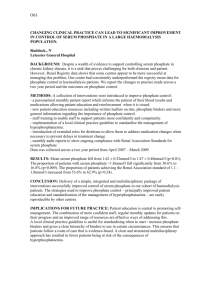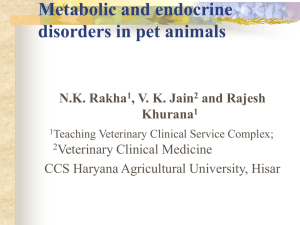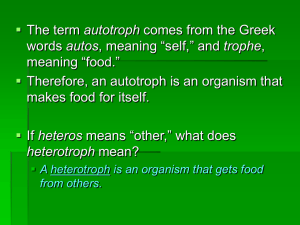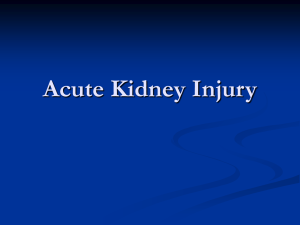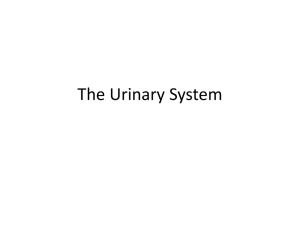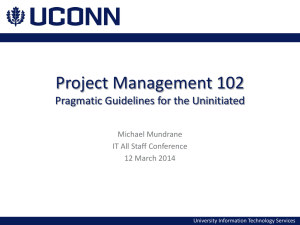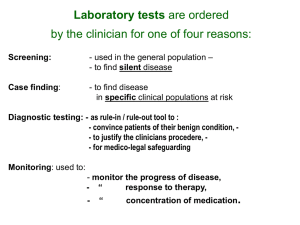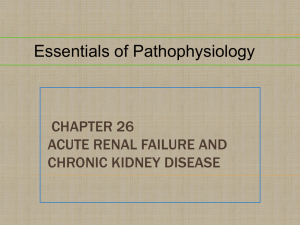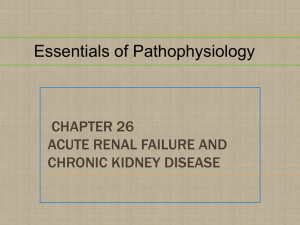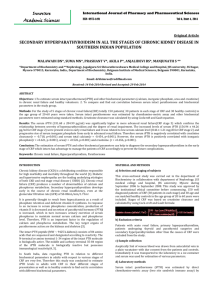Chronic Renal Failure in Cats
advertisement
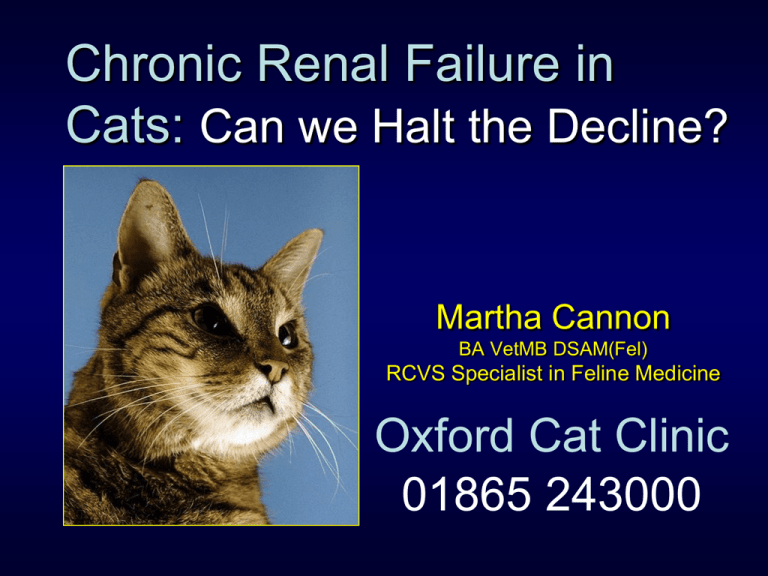
Chronic Renal Failure in Cats: Can we Halt the Decline? Martha Cannon BA VetMB DSAM(Fel) RCVS Specialist in Feline Medicine Oxford Cat Clinic 01865 243000 Chronic Kidney Disease Progression of renal failure 100% Early renal failure & clinical signs (azotaemia) Death 33% 25% 10% Early renal disease (loss of renal reserve) Renal insufficiency Uraemia Chronic Kidney Disease Consequences of Kidney Disease Polyuria / polydipsia dehydration Nausea vomiting / inappetence Renal secondary hyperparathyroidism ( Phos) Proteinuria Hypertension Hypokalaemia Urinary tract infections Anaemia IRIS Staging System Creatinine Serum Phosphate Proteinuria Blood Pressure CRF: IRIS Staging System Creatinine: After treating dehydration Stage 1: Non-azotaemic > 33% nephrons Stage 2: Creat 140 – 250 33-25% nephrons Stage 3: Creat 251 – 439 25-10% nephrons Stage 4: Creat > 440 <10% nephrons Aims of Treatment Stage 2: Creatinine 140-250 μmol/l Aim: (Reverse the cause) Prevent progression (Serum phosphate, urine protein and UTI’s, blood pressure) Stage 3: Creatinine 251-439 μmol/l Aim: Prevent progression and manage azotaemia to improve quality of life Stage 4: Creatinine >440 μmol/l Treatment mostly aimed at managing azotaemia IRIS Staging System Creatinine Serum Phosphate Proteinuria Blood Pressure Hyperphosphataemia IRIS recommendations: Stage I + II: Stage III: Stage IV: 0.81-1.45 mmol/l 0.81-1.61 mmol/l 0.81-1.94 mmol/l Recommended levels are well within laboratory reference ranges Hyperphosphataemia Reduced phosphate diet is most effective treatment Additional advantages of prescription diets Reduced azotaemia, K+ supplement, Vit B supplement, soluble fibre, ? Omega-3 FAs Hyperphosphataemia Protein Restricted Diet Reduces uraemia Improves well-being, appetite, activity Reduces dietary phosphate intake Controls hyperphosphataemia Prolongs life-span Median 800 days vs 264 days Hyperphosphataemia Reduced phosphate diet is most effective way to control phosphate Additional advantages of prescription diets Reduced azotaemia, K+ supplement, Vit B supplement, Soluble fibre, Omega-3 FAs ... ... Chronic Kidney Disease Nutritional Management Ensure adequate intake Delay introduction until cat feels well Learned food aversion Canned diets Energy from fat cf carbohydrate Increased fluid intake Phosphate Binders Hyperphosphataemia despite dietary control Allow 6-8 weeks for control of phosphate Gradual introduction of binder if phosphate remains high Hyperphosphataemia Intestinal Phosphate Binders ~10% reduction in serum phosphate Give mixed with food Divide between all meals Introduce gradually and titrate to effect Monitor serum calcium when introducing binders IRIS Staging System Creatinine Serum Phosphate Proteinuria Blood Pressure IRIS Staging System Rule out UTI / FLUTD Must check urine sediment or culture Asymptomatic bacterial urinary infections are common in cats with CKD, especially female cats IRIS Staging System Proteinuria with no active sediment UP:C > 0.4 = proteinuric Treat with an ACE inhibitor UP:C < 0.2 = non-proteinuric No treatment required UP:C 0.2-0.4 =borderline Monitor / treat Chronic Renal Failure Urinary Tract Infections Asymptomatic UTI’s Female cats Low urine SG ? Occult pyelonephritis Risk of ascending infection renal damage Chronic Renal Failure Urinary Tract Infections Treatment 4-6 weeks of antibiotic Bactericidal antibiotic Repeat urine sediment +/- culture Before end of antibiotics 10 days after ceasing antibiotics IRIS Staging System Creatinine Serum Phosphate Proteinuria Blood Pressure CRF: IRIS Staging System Hypertension Common consequence of CRF Contributes to progression of CRF CRF: IRIS Staging System Blood Pressure “Risk of end organ damage” < 150 mmHg = Minimal risk 150-160 mmHg = Low risk 160-180 mmHg = Moderate risk > 180 mmHg = High risk www.iris-renal.com CRF: Blood Pressure For cats with CRF Maintain BP below 170 mmHg Amlodipine: 0.625 – 1.25 mg per cat per day 1/8 or 1/4 of a tablet once daily Adjunctive Treatment Benazepril Chronic Renal Failure in Cats: Can we Halt the Decline? Martha Cannon BA VetMB DSAM(Fel) RCVS Specialist in Feline Medicine Oxford Cat Clinic 01865 243000
